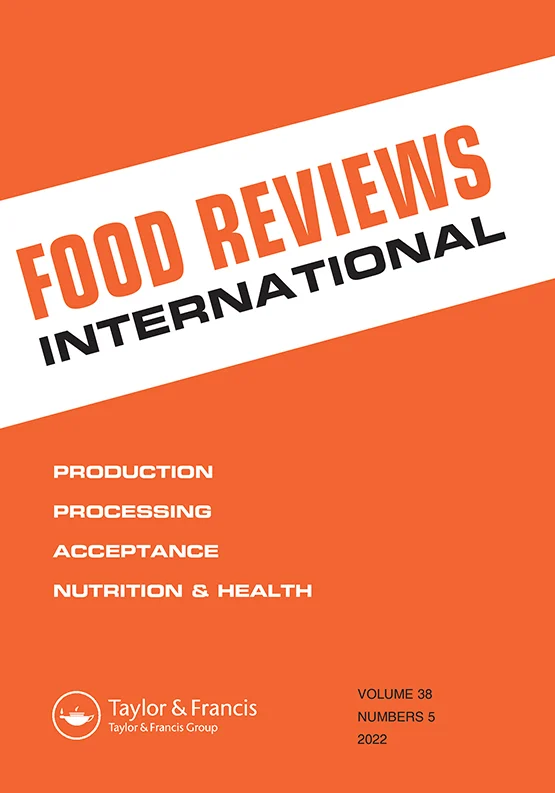石灰中的植物化学物质及其潜在的健康益处:综述
IF 5.3
2区 农林科学
Q1 FOOD SCIENCE & TECHNOLOGY
引用次数: 0
摘要
摘要澳洲柑橘(citrus australasica),又名指青,因其强大的抗氧化能力和促进健康的功效,近年来备受关注。它们已被应用于食品工业作为水果或加工成苏打水,调味酒,果酱和干粉。特别是,酚类化合物是指石灰中大量的生物活性成分,包括酚酸、黄烷-3-醇、黄烷酮、花青素、黄酮、黄酮醇和异黄酮。此外,有机酸、矿物质、类胡萝卜素、维生素、叶绿素等其他生物活性植物化学物质也显示出其作用。它们协同作用,使手指石灰成为一种有益的来源,通过避免过量摄入营养素(抗营养活性)和释放氧化压力(抗氧化能力),可以预防人们患慢性疾病,包括糖尿病、肥胖、心血管疾病和癌症。因此,手指石灰提取物可以作为一种功能性成分,在营养或药理学领域,以降低风险。本文综述了手指石灰中特定的生物活性化合物及其相应的生物活性。关键词:手指酚类化合物抗氧化抗营养生物活性治疗效果致谢我们要感谢墨尔本大学理学院农业、食品和生态系统科学学院Hafiz Suleria博士小组的研究人员,他们给予了我们难以置信的支持。披露声明作者声明,他们没有已知的竞争经济利益或个人关系,可能会影响本文所报道的工作。Hafiz Suleria博士是澳大利亚政府资助的澳大利亚研究委员会发现早期职业奖(ARC-DECRA-DE220100055)的获得者。本研究由墨尔本大学在麦肯齐奖学金计划下资助。UoM-18/21),未来食品标志研究倡议基金(批准号:UoM-21/23)及合作研究发展补助金(资助号:UoM-21/23),由澳大利亚墨尔本大学兽医和农业科学学院资助。澳大利亚研究理事会-发现早期职业奖(ARC-DECRA - DE220100055)。由澳大利亚政府创立。本文章由计算机程序翻译,如有差异,请以英文原文为准。
Phytochemicals in finger lime and their potential health benefits: A review
ABSTRACTCitrus australasica, also named finger lime, has been drawing lots of attention recently due to its potent antioxidant capacity and health-promoting benefits. They have been applied to the food industry as fruit or processed into soda, flavor liquor, jam, and dried powder. Especially, phenolic compounds are of prime interest as a large group of bioactive components in finger lime, including phenolic acids, flavan-3-ols, flavanones, anthocyanins, flavones, flavonols, and iso-flavonoids. Besides, other bioactive phytochemicals have also shown their roles, such as organic acids, minerals, carotenoids, vitamins, and chlorophylls. They synergically trigger finger lime to be a beneficial source, which can prevent people from chronic diseases, including diabetes, obesity, cardiovascular disease, and cancer, by avoiding excessive intake of nutrients (anti-nutritional activity) and releasing oxidation pressure (antioxidant capacity). Therefore, the extracts of finger lime can be used as a functional ingredient in alimentology or pharmacology areas to lower the risk. Our review aimed to summarize the specific bioactive compounds and their corresponding bioactivities in finger lime.KEYWORDS: Finger limephenolic compoundsantioxidantanti-nutritionalbioactivitiestherapeutic effects AcknowledgmentsWe would like to thank researchers of the Dr Hafiz Suleria group from the School of Agriculture, Food and Ecosystem Sciences, Faculty of Science, the University of Melbourne for their incredible support.Disclosure statementThe authors declare that they have no known competing financial interests or personal relationships that could have appeared to influence the work reported in this paper.Additional informationFundingDr Hafiz Suleria is the recipient of an Australian Research Council—Discovery Early Career Award (ARC-DECRA—DE220100055) funded by the Australian Government. This research was funded by the University of Melbourne under the McKenzie Fellowship Scheme (Grant No. UoM-18/21), the Future Food Hallmark Research Initiative Funds (Grant No. UoM-21/23) and Collaborative Research Development Grant (Grant No. UoM-21/23) funded by the Faculty of Veterinary and Agricultural Sciences, the University of Melbourne, Australia. Australian Research Council - Discovery Early Career Award (ARC-DECRA – DE220100055). founded by Australian Government.
求助全文
通过发布文献求助,成功后即可免费获取论文全文。
去求助
来源期刊

Food Reviews International
工程技术-食品科技
CiteScore
11.50
自引率
1.70%
发文量
127
审稿时长
>24 weeks
期刊介绍:
Food Reviews International presents state-of-the-art reviews concerned with food production, processing, acceptability, and nutritional values—examining the relationship of food and nutrition to health, as well as the differing problems affecting both affluent and developing nations. Offering technical solutions to critical global food dilemmas and shortages, Food Reviews International contains articles of interest for:
•food scientists and technologists
•food and cereal chemists
•chemical engineers
•agriculturists
•microbiologists
•toxicologists
•nutritionists
 求助内容:
求助内容: 应助结果提醒方式:
应助结果提醒方式:


